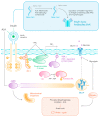Alpha-Lipoic Acid and Glucose Metabolism: A Comprehensive Update on Biochemical and Therapeutic Features
- PMID: 36615676
- PMCID: PMC9824456
- DOI: 10.3390/nu15010018
Alpha-Lipoic Acid and Glucose Metabolism: A Comprehensive Update on Biochemical and Therapeutic Features
Abstract
Alpha-lipoic acid (ALA) is a natural compound with antioxidant and pro-oxidant properties which has effects on the regulation of insulin sensitivity and insulin secretion. ALA is widely prescribed in patients with diabetic polyneuropathy due to its positive effects on nerve conduction and alleviation of symptoms. It is, moreover, also prescribed in other insulin resistance conditions such as metabolic syndrome (SM), polycystic ovary syndrome (PCOS) and obesity. However, several cases of Insulin Autoimmune Syndrome (IAS) have been reported in subjects taking ALA. The aim of the present review is to describe the main chemical and biological functions of ALA in glucose metabolism, focusing on its antioxidant activity, its role in modulating insulin sensitivity and secretion and in symptomatic peripheral diabetic polyneuropathy. We also provide a potential explanation for increased risk for the development of IAS.
Keywords: alpha-lipoic; complications; diabetes prevention; glucose metabolism.
Conflict of interest statement
The authors declare no conflict of interest.
References
-
- Konrad D., Somwar R., Sweeney G., Yaworsky K., Hayashi M., Ramlal T., Klip A. The antihyperglycemic drug alpha-lipoic acid stimulates glucose uptake via both GLUT4 translocation and GLUT4 activation: Potential role of p38 mitogen-activated protein kinase in GLUT4 activation. Diabetes. 2001;50:1464–1471. doi: 10.2337/diabetes.50.6.1464. - DOI - PubMed
-
- Ghelani H., Razmovski-Naumovski V., Nammi S. Chronic treatment of (R)-α-lipoic acid reduces blood glucose and lipid levels in high-fat diet and low-dose streptozotocin-induced metabolic syndrome and type 2 diabetes in Sprague-Dawley rats. Pharmacol. Res. Perspect. 2017;5:e00306. doi: 10.1002/prp2.306. - DOI - PMC - PubMed
Publication types
MeSH terms
Substances
Grants and funding
LinkOut - more resources
Full Text Sources
Medical


